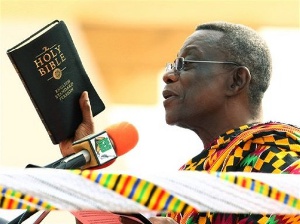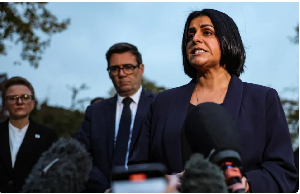Professors S. KWAKU ASARE and H. KWASI PREMPEH
Two U.S.-based Ghanaian constitutional scholars have questioned the constitutionality of the on-going constitutional review exercise initiated by the President. In a forthcoming article in African Journal of International and Comparative Law, the scholars, Professors S. Kwaku Asare and H. Kwasi Prempeh, argue that, in acting on his own initiative to empanel a commission to review the Ghana constitution and set an agenda and timetable for proposed constitutional amendments, the President exceeded the scope of his constitutional authority. The two scholars explain that, while they believe certain parts and aspects of Ghana’s current constitution are defective and need revision, the questions whether, when, how and by whom any changes to Ghana’s constitution shall take place are not matters of presidential prerogative. As they state in their article, their “main concern is with process, namely the means by which any such constitutional revision must be pursued and, specifically, which organ of government must determine the timing and set the agenda for constitutional reform.” In their view, “agreement on matters of substance must not be allowed to cloud or subvert fidelity to sound process.” Basing their arguments on a comprehensive analyses of various provisions of the Ghana constitution and on a host of other policy considerations, Professors Asare and Prempeh maintain that any and all initiatives to amend the Constitution must originate from Parliament The Ghanaian scholars are troubled by what they see as a dangerous precedent, one that, in their view, further entrenches the negative phenomenon of an imperial presidency in Ghana’s political tradition.
The gravamen of the 40-page length article is that the President’s power to appoint commissions under Article 278(1), which is the basis for setting up the CRC, is not unlimited and does not extend to amending the Constitution, which the Constitution has carved out for other Constitutional organs. Under Article 278 (1) “the President shall, by constitutional instrument, appoint a commission of inquiry into any matter of public interest where the President is satisfied that a commission of inquiry should be appointed.” However, Asare and Prempeh argue that a comprehensive review of the constitution is an act sui generis, not just “any” matter of public interest that is to be governed by the generic provisions relating to ad hoc commissions of inquiry. Rather, the only appropriate constitutional text that must inform and govern the process of constitutional review in Ghana is the specific provisions of the constitution that set forth the structure and mechanics of constitutional amendment, namely articles 289, 290, 291 and 292, which together constitute chapter 25 of the constitution.
The scholars contend that it is improper to read the power to appoint commissions literally and then proceed, on that literal interpretation, to allow the general provision of Article 278(1) to supplant the specific provisions of the constitution dealing with amendments. They support this latter point by citing the Wulensi Parliamentary case, where the Supreme Court held that the Court’s general supervisory power does not supplant the specific electoral adjudication scheme established by Article 99. On the chapter on amending the constitution, the scholars note that it opens with “Subject to the provisions of the Constitution, Parliament may, by an Act of Parliament, amend any provision of this Constitution,” and classifies the provisions of the constitution into entrenched and non-entrenched provisions. They note that the primary difference in the process of amendment between the two classes of constitutional provisions is that, while an amendment of an entrenched provision must secure the approval of a super-majority (75%) of voters in a national referendum (with a minimum voter participation rate of forty percent of registered voters), amending a non-entrenched provision requires the approval of only a super-majority of legislators. In each case, before an approved amendment comes into effect it must have received the assent of the President. Importantly, however, the constitution makes the President’s assent mandatory, and thus merely a ministerial act, once a proposed amendment has secured the requisite popular or legislative approval. Thus, it can be said that the President’s role in constitutional amendment is, at most, ritualistic.
With regard to whether the President can unilaterally initiate a process of constitutional amendment, the scholars note that “the Constitution is always quite clear when the intention is to have the President, and only the President, originate particular kinds of legislation. This is the case, for example, with bills relating to public finance. Thus, for instance, in article 174 (1), the constitution states that “no taxation shall be imposed otherwise than by or under the authority of an Act of Parliament.” To forestall disputation as to when and by whom a bill of taxation is to be originated, Article 179 (1) specifically empowers and commands the President to “cause to be prepared and laid before Parliament at least one month before the end of the financial year, estimates of the revenues and expenditure.” Similarly, in Article 108, the constitution clearly bars Parliament from proceeding on bills that impose charges on the consolidated or other public funds, “unless the bill is introduced by, or on behalf of the President.” The express delineation in the constitution of those specific instances where legislative initiative belongs to the President implies, following the maxim “expressio unius est exclusio alterius,” that in all other cases the origination of legislative action must remain with the legislative body itself. Thus, when Article 289 (1) expressly designates Parliament as the body that “may amend any provision of the constitution,” and does not designate the President as the one who must introduce a bill of amendment, it must be understood that the origination power in matters of constitutional amendment remains with Parliament. Not only that, but also no extra-parliamentary body is empowered to do any preparatory work for Parliament, unless Parliament itself has validly authorized such a body. The scholars also lay down strong policy considerations that make the case for Parliament, not the President, as the primary actor and initiator in the area of constitutional amendment. First, Parliament’s membership straddles the diverse political and regional demography of the nation. Second, in light of the super-majority threshold that a proposed constitution must clear in the legislature or the national referendum in order to be approved, the way to assure and build the necessary degree of bipartisan support and cooperation for a constitutional revision agenda is not to run it as a single-party/presidential agenda until the process has advanced to a point when bi-partisan co-optation may well be too late. At a minimum, the majority and minority parties in Parliament must have an equal opportunity early in the process to put forth their own plans and priorities for constitutional reform, rather than have the President and his party hijack the process from the beginning and hope, in the end, to win over the opposition party.
Third, the Parliament of Ghana is already structured internally to handle matters related to constitutional and legal reform. Among the committees of parliament is a Committee for Legal and Constitutional Affairs. There are also committees on the judiciary and on various other functional areas of government. Parliament can therefore easily and efficiently manage the business of constitutional review by parceling out the various constitutional review proposals of different political parties to appropriate functional-area or subject-matter committees. Fourth, placing Parliament in the driver’s seat in matters of constitutional review would ensure that the decision whether to commence or undertake a review of the constitution is “de-centralized” rather than left to sole discretion or will of the President. Fifth, the history of presidential abuse of the amendment power in Ghana, counsels against leaving the President in charge of determining the timing of, and setting the agenda for, constitutional reform. The immediate post-independence experience, especially under the First Republic, is particularly instructive in this regard where the then President used the power to amend to consolidate more and more power in the Presidency.
On the use of the Constitutional Review Commission as a vehicle for initiating constitutional amendments, the scholars noted that it was alien to the 1992 Constitution. They identified four ways of initiating amendments to constitutions: (1) initiative; (2) legislative resolution; (3) constitutional convention; or (4) a review commission. An initiative requires citizens to gather a set number of signatures or petitions calling for an amendment to be placed on a ballot. It is typically invoked by filing with a designated official (e.g., Electoral Commissioner) a copy of the proposed revision or amendment, signed by the required number of citizens. Legislative resolutions are resolutions that emanate from the legislature. A constitutional convention is convened to consider a revision of the entire constitution. For instance, in March 1960, the Government of Ghana convened a constitutional convention to consider its proposals for a Republican Constitution.
A review commission is typically a constitutional created agency that convenes at set intervals to review the constitution and make proposals for amendments. For instance, Article X1 (2) of the Florida Constitution provides that “a) Within thirty days before the convening of the 2017 regular session of the legislature, and each twentieth year thereafter, there shall be established a constitution revision commission composed of the following thirty-seven members:
(1) the attorney general of the state; (2) fifteen members selected by the governor; (3) nine members selected by the speaker of the house of representatives and nine members selected by the president of the senate; and (4) three members selected by the chief justice of the supreme court of Florida with the advice of the justices. (b) The governor shall designate one member of the commission as its chair. Vacancies in the membership of the commission shall be filled in the same manner as the original appointments. (c) Each constitution revision commission shall convene at the call of its chair, adopt its rules of procedure, examine the constitution of the state, hold public hearings, and, not later than one hundred eighty days prior to the next general election, file with the custodian of state records its proposal, if any, of a revision of this constitution or any part of it.”
What is important about these vehicles for initiating constitutional amendments is that they are not to be used in a random or ad hoc fashion. Rather, each constitution must choose which vehicles are allowed. Ghana’s 1992 Constitution chose only legislative resolution as the path to initiate constitutional amendments. Therefore, that is the only path to amend the Constitution! Some may find it desirable for a Commission to review the Constitution, every so often. If so, the authors argue, the appropriate thing to do is to make express provision in the constitution for the use of that approach, as illustrated in the Florida example. In a related vein, some too may find a citizen petition as an appropriate mode of triggering a constitutional amendment. If so, then the constitution must make provision for the use of such a method of constitutional revision.
The article is available at http://papers.ssrn.com/sol3/papers.cfm?abstract_id=1614365
Opinions of Tuesday, 25 May 2010
Columnist: Asare Kwaku & Prempeh Kwasi















